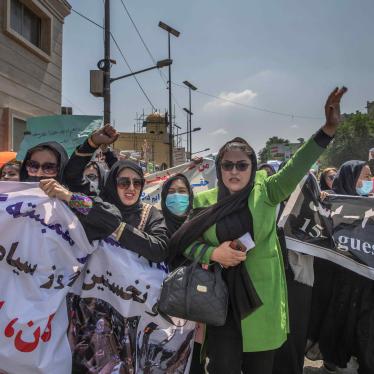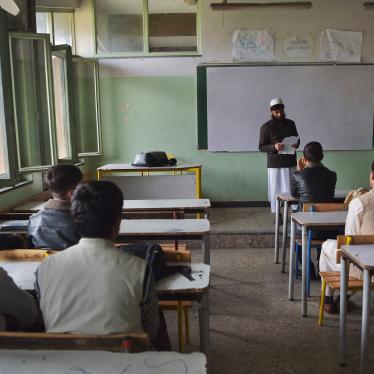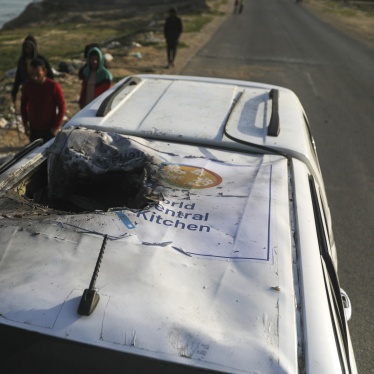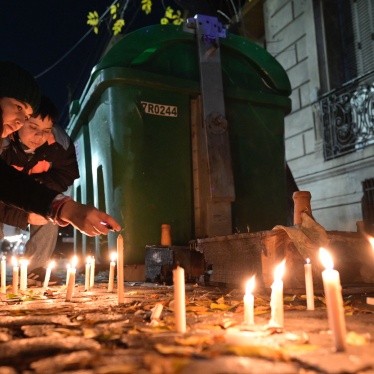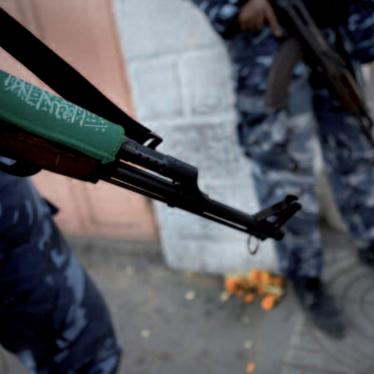Dear Ms/Mr/Ambassador:
As the Afghan Support Group meets on Wednesday, Human Rights Watch urges you to ensure that three areas, often low on the priority list for post-conflict planning, are considered: justice and accountability, reintegration of refugees and the displaced, and demining. Particularly in the first two areas, attention to the particular needs of women is critical. We hope the ASG can use its influence to ensure that programs in each of these areas are adequately funded.
Justice and Accountability
The donor community needs urgently to develop a strategy for how to address security needs in the immediate term (logistic support for secure and humane detention centers is one painfully apparent need) and for the post-conflict period. It then needs to provide the funding to make the strategy work. Managing the transfer of security functions from armed warlords to national police is not going to be easy, but the problem needs attention now. Afghanistan's legal system urgently needs to be rebuilt. At best, its sway never extended far beyond major urban areas, but in the early 1970s, there were good criminal and civil codes, a system of district courts, and a reputable law faculty at Kabul University. Major resources are going to be needed for retraining and recruiting jurists, prosecutors, attorneys, police officers, and court personnel. The Afghan diaspora includes many professionals with these skills; work should start now on identifying them.
Tribal justice systems operative in rural areas are probably not going to be able to address issues that involve crimes, including property crimes, committed by a party that is not a member of the tribe or ethnic group in question. They may also be unable to fairly address crimes against women. Land disputes will be a huge issue as refugees and the displaced return, and as political power shifts.
Accountability for past abuses will also have to be addressed. Human Rights Watch has recommended that the Security Council authorize a Commission of Experts to investigate war crimes, crimes against humanity, and other serious abuses in Afghanistan. That Commission will also need funding.
Assistance will be needed to build rights protections into Afghan law. In light of the systematic discrimination against women by the Taliban, it is vital that a new government establish laws guaranteeing women's rights to education, free expression, mobility, employment, and health care.
Refugees and Displaced
To ensure that the needs of returning refugees and displaced persons are adequately addressed, donors may want to assist a transition government to set up a department for refugees, displacement and repatriation to liaise with U.N. and NGO officials on all issues relating to displacement, repatriation, and reintegration. It should also encourage a transition government to establish a joint commission with representatives of Afghanistan, Pakistan, and Iran, as well as UNHCR, to ensure the sustainable and voluntary repatriation of Afghan refugees and internally displaced persons. The commission, whose membership would include representatives from the refugee and displaced communities, would establish timetables for repatriation, draft principles and criteria for voluntary repatriation that ensure maximum protection for returnees, identify short and long-term funding needs, and draw up specific repatriation agreements between these countries that include core protection safeguards. Donors and their Afghan partners should pay particular attention to the protection needs of displaced refugee women and children and ensure that women play a key role in the planning and implementation of return and reintegration programs. Funding for programs for women should be directly channeled where possible to Afghan women's NGOs, and the programs should be crafted so that they reach rural women, widows, and women who are disabled, internally displaced, or illiterate.
Demining
Expanded programs for demining and mine awareness education are already on the agenda of the World Bank, but we would like to underscore the need for resources. Before U.S. led attacks began in early October, Afghanistan was already littered with land mines and unexploded ordnance (UXO). In 2000, there were almost 100 mine or UXO casualties a month (which itself was a sharp decline over recent years). Since October, thousands of missiles and bombs have been launched or dropped by U.S. and British forces into Afghanistan, many of which fail to detonate and become hazardous uxo. Cluster bombs are especially dangerous because of the high "dud rate" of the innocuous-looking bomblets they drop. Training to clear this new type of UXO is urgently needed. We also note
that rapid clearance of roads is essential if the safe and timely delivery of humanitarian aid is to be ensured.
Thank you for your attention to these matters.
Sincerely,
/s/
Sidney Jones
Executive Director
Asia Division
